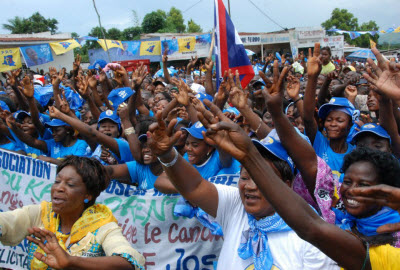The Independent National Electoral Commission has said that the polls will go ahead as planned, despite violent clashes Saturday between supporters of the leading presidential candidates that led to the deaths of at least 4 people in Kinshasa.
Having won the first democratically held elections in the Democratic Republic of Congo in 2006, President Joseph Kabila is seeking a second term in office to consolidate the “gains” of the last five years.
Mr. Kabila has touted DR Congo’s economic “progress” since the last elections, with the country showing a positive growth rates for the last two years, “despite a difficult international economic environment.”
The ruling majority has also bragged about most of DR Congo’s debt being cancelled by international donors earlier this year after the government met requirements under the International Monetary Fund’s Heavily Indebted Poor Countries Initiative (HIPC).
During the campaign, Mr. Kabila asked voters for more time to implement his signature infrastructure and modernization plan, known as the Cinq Chantiers, mainly funded by a massive 9$ billion deal signed with China in 2008.
Opponents have called Mr. Kabila’s economic prowess fictional and disconnected with the Congolese people’s daily realities.
Whatever the economic growth rates for the last two years, they say the “gains” have not trickled down to the population. They point to other economic statistics such as DR Congo being ranked last on the UNDP’s Human Development Report in 2011, and most of the Congolese still living in poverty, despite DR Congo being one of the richest countries in the world in terms of natural resources.
The two leading opposition presidential candidates, Etienne Tshisekedi and Vital Kamerhe, have said they can do better and have vowed if elected to fight against the endemic corruption and lack of transparency seen under Mr. Kabila’s watch.
During the campaign, Mr. Tshisekedi called president Kabila “the biggest thief in the world” and worse than Mobutu Sese Seko. Mr. Kamerhe accused Mr. Kabila of lying about his “negative” economic record.
So, after a campaign charged with claims and counter-claims, it’s time for the voices of the Congolese people to be heard. Only they know who is telling the truth and who is lying.
Related articles
- • European Union Sanctions Rwanda and M23 Officials over Congo Conflict (March 17, 2025)
- • Tshisekedi Announces Government of National Unity and Calls for Unity Against M23 Rebels (February 23, 2025)
- • DR Congo Citizens Head to Polls to Elect President, Members of Parliament (December 20, 2023)
- • Felix Tshisekedi Sworn In as DR Congo President (January 24, 2019)
- • Constitutional Court Declares Tshisekedi Winner of Presidential Election (January 19, 2019)
- • Martin Fayulu Challenges Presidential Election Results in Court (January 12, 2019)
- • Felix Tshisekedi Vows to Be the President of All Congolese (January 10, 2019)
- • Martin Fayulu Rejects Presidential Election Results (January 10, 2019)
- • Felix Tshisekedi Elected DR Congo President (January 10, 2019)
- • DR Congo Delays Results of December Election (January 6, 2019)
- • Bemba, Katumbi renew their support for joint opposition presidential candidate Fayulu (November 16, 2018)
- • Vital Kamerhe also withdraws support for joint opposition presidential bid (November 12, 2018)
- • Felix Tshisekedi withdraws support for joint opposition presidential bid (November 12, 2018)
- • Oppositioin leaders pick Martin Fayulu as joint presidential candidate (November 11, 2018)
- • Jean-Pierre Bemba banned from running for president (August 25, 2018)
- • Vital Kamerhe named UNC presidential candidate (August 4, 2018)
- • Bemba says Katumbi should be allowed to run for president (August 4, 2018)
- • Moise Katumbi blocked from entering DR Congo (August 3, 2018)
- • Jean-Pierre Bemba Returns to DR Congo (August 1, 2018)
- • Jean-Pierre Bemba named MLC presidential candidate (July 13, 2018)
- • Botswana Urges Joseph Kabila to Step Down (February 26, 2018)
- • No elections in DR Congo in December without electronic voting machines: INEC (February 13, 2018)
- • US Warns DR Congo Against Electronic Voting for Delayed Election (February 12, 2018)
- • Presidential election scheduled for December 23, 2018 (November 5, 2017)
- • Felix Tshisekedi accuses INEC of illegally prolonging Kabila's mandate (October 24, 2017)
- • DRC Seeks Arrest of Presidential Candidate Moise Katumbi (May 19, 2016)
- • Papa Wemba Is Buried in Kinshasa (May 4, 2016)
- • Papa Wemba Awarded Highest National Honor as Thousands Pay Tribute (May 2, 2016)
- • DR Congo Scores High on Growth, Lags in Poverty Reduction: IMF (October 13, 2015)
- • Political tensions 'running high' in DR Congo ahead of 2016 elections (October 7, 2015)








